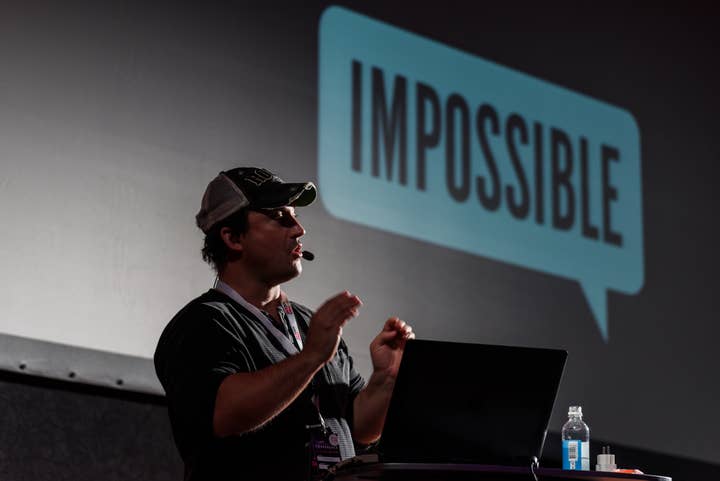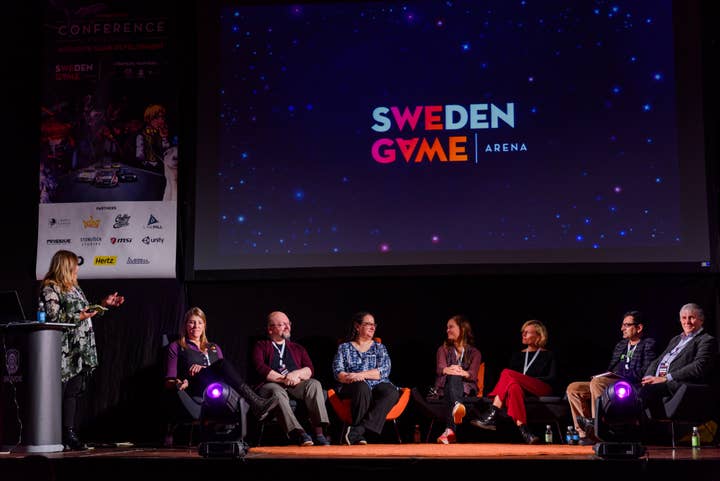Volvo, the military and game design: A small town in three parts
Sweden Game Arena's Laura Bularca on diversity in Skovde
There's no getting away from it, Skövde is a small town. Looking at it on Wikipedia for a few tips before I set off to the Sweden Game Conference earlier this month, I'm given a couple of top-level highlights:
1) Skövde hosts an absolutely enormous Volvo engine manufacturing plant.
2) It's also a fairly major base for the Swedish army.
Panicking slightly, I ask a few Swedish dev friends, who give me a third:
3) It's rapidly challenging Gothenburg, Malmo and Stockholm for the crown of Sweden's game development centre.
Those first two things seem like a relatively sensible fit for a small town of 10,000 or so people. The army needs both engines and engineers, so having something like a tank regiment garrisoned near your country's largest heavy manufacturing centre makes a lot of sense, but over the course of the last 15 years, Skövde University has been quietly adding a third pillar to the local economy with a surprising amount of crossover: game design.
From humble beginnings in 2002, over 500 students are now currently learning their trade in the university's halls. As well as the pure academia, the university also offers incubation and research programs, and is extending its reach in other areas, under the collective name of Sweden Game Arena.

Whilst many of Skövde's students have gone on to work elsewhere, both in Sweden and abroad, more and more are hanging around after they graduate, creating a development scene to go alongside the burgeoning student population. For the last few years, Skövde also been home to the Sweden Game Conference - an attempt to marry the student talent to international mentoring and top-level industry advice. This year's show, centred around the theme of diversity, attracted over 800 attendees, with 38 exhibiting companies and 43 talks from speakers such as Chris Avellone, Kate Edwards, Warren Spector and Dr Mitu Khandaker-Kokoris. We caught up with organiser Laura Bularca, also a developer in her own right, to find out more about game dev life in a small town.
"The game industry in skövde is the fruit of the combined efforts of enterprise, academia and society"
The town is kind of dominated by the Volvo factory and the military bases. Do they make for strange neighbours?
Laura Bularca: We actually make great neighbours! We collaborate quite a lot with Volvo and also push our studios for projects where Volvo or the military requires game development expertise. From an academic perspective, quite a bit of our research in serious games and simulation is done in collaboration with Volvo and the Military (some of our PhDs and other research projects have been co-founded by them, for example).
We have the Military days celebrated every year at our Science park! And that is really cool, we all come to work and it looks a little like World of Tanks... I think everyone realises not only that the video games industry is growing, but also that it can be a part of industries that are traditionally considered serious, like car manufacturing or military. Besides, everyone in Skövde plays games, and I think a lot of people are pretty proud to play locally produced games!
Why choose diversity as a theme?
Laura Bularca: Inclusive Game Development is actually a theme that has been on our mind for quite a while now. I am so happy to say that we have actually been working for almost a year to develop it and to get the best lecturers here, in Skövde, who can really add to it and promote it - like Kate Edwards, David Gaider, Warren Spector, Chris Avellone and so many more.
The reason is simple: everybody plays games, so its only natural that the workforce reflects that. However, despite the work that everyone in the community has done to promote a friendly, open, inclusive and diverse environment, we still have troubles convincing more ladies and minorities to join us. And I think it is understandable and this is a long term process, which is why this years conference is also a request for help. We welcome really any input, idea and suggestion as to how to make Skövde and the West part of Sweden a place where a diverse, inclusive game development environment happens naturally. Of course, there is a lot to be done externally but we ourselves are aware of the introspection and changes we have to make internally. For example, we have a lot of studios who are still quite homogeneous despite their struggle for diversity.

Where does the push to diversity begin? Employers? Education?
Laura Bularca: The simple answer is: everywhere. There is a lot of effort from all our organisation: from the University, the studios, the municipality, everyone. We actively encourage diverse people to come and test their business idea in our pre-incubation program called Framtiden (The Future), where across 10 weeks of business and development training, we help the applicants to build a prototype for their game idea. In Framtiden we started to have much more diverse teams and even leaders with uncommon backgrounds, such as Gemma Thompson, the founder of Lady Cade amongst so many wonderful initiatives, who moved to Sweden and is currently building her own game studio.
How do you approach it?
Laura Bularca: At the University, we have the DONNA program and of course a lot of amazing teachers who actively fight for diversity, like Jenny Brusk. We also collaborate with Diversi and we do have a Diversi cell in Skövde, who benefits by a lot of attention and involvement from Dilaram Massimova, the only lady CEO of a game studio currently in our network and the second lady to ever hold this role in our organization. We also collaborate with TjejHack, by offering our space and support to host events and game jams.
"There is no good way to track the effects of our actions, but we do register a steady increase of ladies enrolling at our game development programs year by year"
Of course there is a lot of informal effort, not only from our side but also from all the studios in our organisation. For example, we have a very high percentage of games with lady protagonists and with very unique design perspectives. Ludosity's ittle Dew is an adventuress, Magnetic: Cage Closed's prisoner, Bird, is a young lady of African descent, and the Goat.... well, lets just say the goat is special.
Is it reflected in the students who apply?
Laura Bularca: There is no good way to track the effects of our actions, but we do register a steady increase of ladies enrolling at our game development programs year by year. For example, last year almost 19% of our students were ladies, a decent increase from 13% as we tracked to have in 2010. Graphics and Design seem to be the favourite for this kind of diversity, with a percentage of 33% for Graphics and 28% for Design being ladies. Of course this is just an example and having a balanced gender representation is just one part of diversity. We do struggle, but we feel we barely started and we also do very much hope for a much more varied and inclusive environment, and we ourselves have quite a lot to do when it comes to that.









